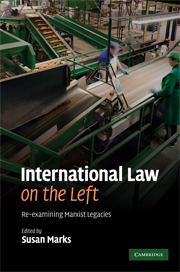Book contents
- Frontmatter
- Contents
- Contributors
- Acknowledgements
- Introduction
- 1 What should international lawyers learn from Karl Marx?
- 2 An outline of a Marxist course on public international law
- 3 The commodity-form theory of international law
- 4 Positivism versus self-determination: the contradictions of Soviet international law
- 5 Marxism and international law: perspectives for the American (twenty-first) century?
- 6 Toward a radical political economy critique of transnational economic law
- 7 Marxian insights for the human rights project
- 8 Marxian embraces (and de-couplings) in Upendra Baxi's human rights scholarship: a case study
- 9 Exploitation as an international legal concept
- Index
7 - Marxian insights for the human rights project
Published online by Cambridge University Press: 07 September 2009
- Frontmatter
- Contents
- Contributors
- Acknowledgements
- Introduction
- 1 What should international lawyers learn from Karl Marx?
- 2 An outline of a Marxist course on public international law
- 3 The commodity-form theory of international law
- 4 Positivism versus self-determination: the contradictions of Soviet international law
- 5 Marxism and international law: perspectives for the American (twenty-first) century?
- 6 Toward a radical political economy critique of transnational economic law
- 7 Marxian insights for the human rights project
- 8 Marxian embraces (and de-couplings) in Upendra Baxi's human rights scholarship: a case study
- 9 Exploitation as an international legal concept
- Index
Summary
Across the globe for well over a century, the ideas of Karl Marx held a special fascination for movements seeking to transform economic, political and social conditions in favour of the ‘have-nots’. That this fascination endured a spectacular array of disappointments, defeats and disasters – ranging from the failure of Marxian predictions about the historical trajectory of capitalism to the massive commission of ignominious crimes in the name of Marxism – merely testifies to the power of those ideas to capture and hold the imagination of those who have yearned to transform the conditions of the disempowered and the deprived.
By now, however, the continued relevance of the Marxian inspiration stands in serious question. Experiments in socialist revolution are widely discredited. Insofar as there remains a global activist project to secure the conditions of a dignified human existence for all, the initiative seems to lie with the human rights movement – quintessentially a liberal design, and one historically in tension with Marxism.
Can Marxian political thought make a positive contribution to the contemporary project of international human rights advocacy? Marxism is ordinarily understood to assert the ‘ideological’ (and thus obfuscatory) character of rights claims and the impossibility of a justice that transcends class interests.
- Type
- Chapter
- Information
- International Law on the LeftRe-examining Marxist Legacies, pp. 220 - 251Publisher: Cambridge University PressPrint publication year: 2008
- 1
- Cited by

